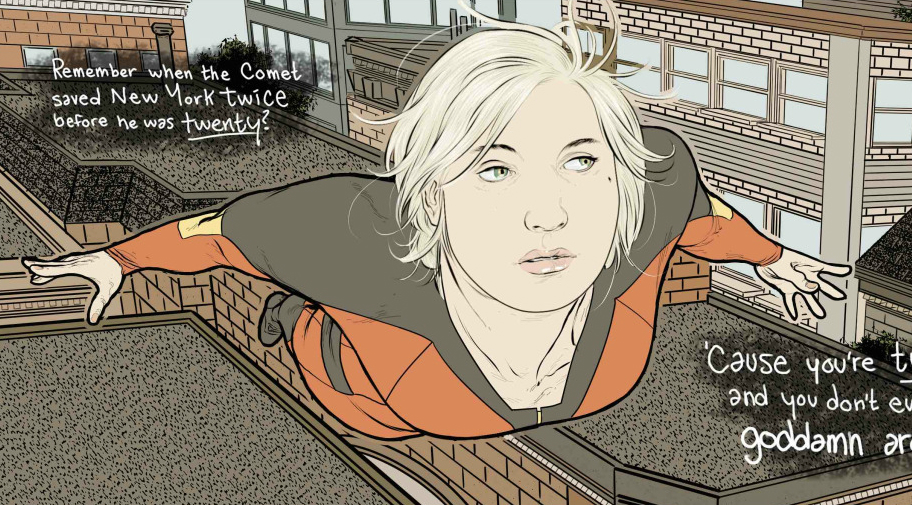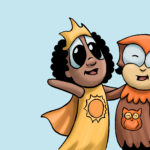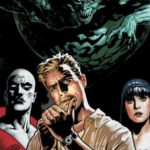
Written by Jonathon O. Lyon
Art by Stephen Morrow
Letters by Boy Roland
Review by Billy Seguire
“How many people’ve died since you decided to sleep in?” – Ellie
 Sometimes the internet just gives you things. That’s what I felt last night as I was scrolling through my feed and came across this comic that overwhelmed me with a simple story handled extremely well. Its expression of self-hatred and mental instability in a lead character, while still casting them in a heroic and positive light, spoke to me on a personal level. Originally posted on April 20th, Super Human explores depression through a character that’s living with it, dressing the narrative in the costume of a superhero comic that makes it accessible to the masses. Including a two-page afterword, it’s only eleven pages long, but in those pages is a passionate message about the way we view and treat ourselves.
Sometimes the internet just gives you things. That’s what I felt last night as I was scrolling through my feed and came across this comic that overwhelmed me with a simple story handled extremely well. Its expression of self-hatred and mental instability in a lead character, while still casting them in a heroic and positive light, spoke to me on a personal level. Originally posted on April 20th, Super Human explores depression through a character that’s living with it, dressing the narrative in the costume of a superhero comic that makes it accessible to the masses. Including a two-page afterword, it’s only eleven pages long, but in those pages is a passionate message about the way we view and treat ourselves.
Ellie is a superhero with depression. At the outset of the comic, she’s struggling with even being able to get out of bed, and that opening line cuts deep as she considers how many people she’s letting down every time she hits the snooze button. She is constantly comparing herself to other heroes and blaming herself for not being good enough, and as someone who has known depression, it’s heartbreakingly realistic to read. In the moment that Ellie steps out her window to fly, a moment that would normally be an elevated moment of absolute freedom, artist Stephen Morrow wisely shows no joy on Ellie’s face. It’s an absence that tells you more about her state of mind than any of the words in the story ever could. She’s not only feeling bad. She’s empty. Even as she’s working hard to break the cycle and pushes herself out into the world, that battle isn’t over.
Beyond her depression, Ellie is something of an enigma as a character, with most of what we know about her centring around how her inner hate-filled thoughts. It’s a focussed approach that really doesn’t tell us anything more than it needs to, but it feels less like those areas have been underdeveloped by the creator and more like they’re details that simply aren’t important to the story they’re trying to tell. Speculation around Super Human has strongly leaned towards Ellie being a queer character, which fits the statistic of depression heavily affecting that group, but Lyon has been steadfast in leaving such definitions up to the interpretation of the reader. He wants everyone to be able to identify with Ellie, regardless of sexuality, and it fits the need-to-know format of the comic. Though if there is an opportunity for Ellie’s adventures to continue in some form, it seems the author’s headcanon may point towards a more explicit exploration of the character could go that way in the future.
As mentioned above, Stephen Morrow adds a whole other level of excitement to Lyon’s words through his visual interpretation of Ellie and her world. Subtle effects like the light sources penetrating the darkened room are gorgeous, and within Ellie’s apartment Morrow lays out an environment that is deeply affected by her introverted lifestyle. Ellie’s costume is drawn simply and unadorned, a perfect representation of a hero who doesn’t have the belief or confidence in herself to flourish, and visually demonstrates the level of care put into the characters, drawing Ellie as a human being first and foremost in every scene with no hint of an attempt at eye candy. The stand out moment for the art, however, is in the massive Kaiju Ellie fights as the centrepiece of this comic. It’s clear that Morrow has had full range to unleash himself, and the opportunity has been relished. The horrific monster fight is probably the closest Super Human gets to being a traditional superhero comic at any point. It’s clear that the lore of the villain here is not the focus, but like many books the villain is a reflection of the hero, in this place physically representing Ellie’s depression not only to the reader, but to Ellie herself as her self-hatred motivates her towards victory. The fact that other citizens don’t seem phased by it, instead acting like a monster attack is a constant occurrence makes it even more of an allegory.
The lettering by Boy Roland is also key, giving voice to the battle Ellie is fighting within herself that makes up the bulk of how Lyon’s story is told. Contrasting this inner dialogue with the outer dialogue between characters and monsters that scream in terrible, guttural noises is an excellent show of graphical skill. It’s handwritten, again stressing the personal perspective of the book, with letters shifting to suit the mood and size denoting tone. It’s not often that the lettering is notable enough to warrant a mention, but the personal nature of this work really makes the accomplishments of this three-man team stand out individually, and Boy Roland has definitely contributed to this comic’s overall feel.
In many ways, Super Human reminded me of Jason Loo’s Pitiful Human Lizard. There’s a fully formed universe within this short story that uses our shared knowledge of superhero comics to instantly pull you into Ellie’s world, telling an original story that works just as well as if this had been an ongoing DC or Marvel book. While the character is clearly designed to exist within the confines of this one story, I would love to see Ellie continue her adventures beyond this one arc, becoming a role model for those struggling with their mental health and joining creators like Loo in creating new spaces that can be built from the ground up as original, inclusive spaces that push comics’ creative boundaries. For many, the fact that the only two speaking characters within this eleven-page comic are women will tell them volumes about the perspective of the creators in creating a work that will speak outside the sphere of the assumed male readership.
VERDICT:
Buy It. It’s rare to be offered a comic that is so generously good for the soul. Depression is a monster I’ve had a lot of contact with in my own life and Lyon nails the internal struggle that I’ve experienced while giving the reader some brilliant catharsis in the conclusion. For the curious, Super Human is available to read directly on Lyon’s blog, where there will hopefully soon be the option to buy as well. I strongly recommend you do buy when hard copies become available, but please at least read this beautiful and personal work. Of extra importance is the afterword, a separate piece that Lyon actually posted on his blog the day before putting the comic up. It deals with many of the same themes as the comic but shows a better perspective on Lyon’s own unallegoried experiences.



